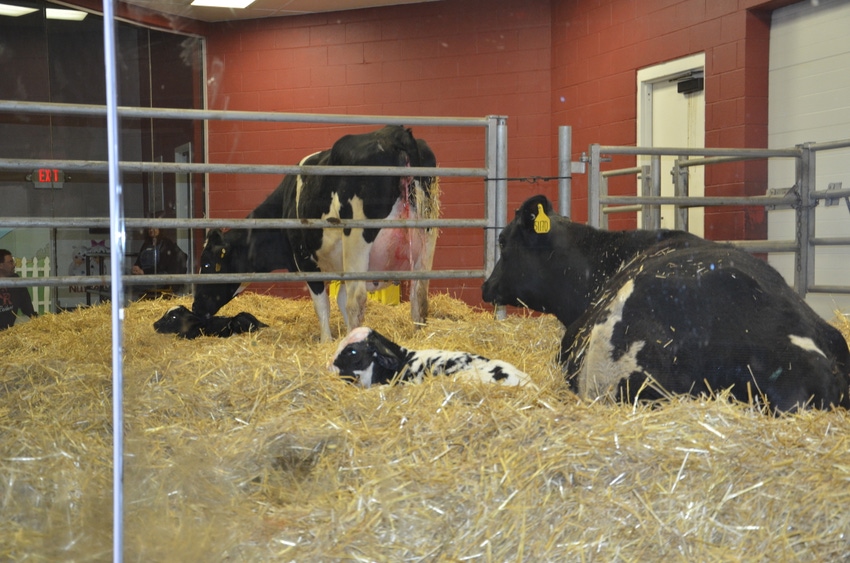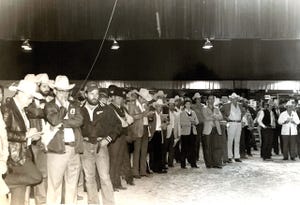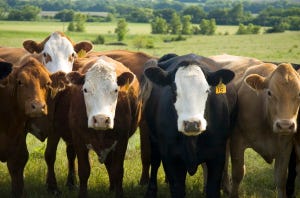What we can learn from the undercover video taken at Fair Oaks Farms
As activists wage war on animal agriculture, here’s what producers can do today to stop bad actors who abuse livestock, protect themselves from bad employees and take ownership on consumer conversations about animal welfare.
June 5, 2019

On June 4, an undercover video shot and produced by the activist group, Animal Recovery Mission (ARM), was released to the public. Some of the video footage included animal abuse that occurred at Fair Oaks Farms, an Indiana dairy operation and popular agricultural tourism destination.
In an official statement, Mike McCloskey, DVM, the founder of Fair Oaks Farm said, “It is a shock and an eye-opener for us to discover that under our watch, we had employees who showed disregard for our animals, our processes and for the rule of law. This ARM video shines a light on an area that – despite our thorough training, employee on-boarding procedures and overall commitment to animal welfare – needs improvement.
“However, as I have stated before, the fact that ARM takes months before notifying owners or authorities regarding ongoing animal abuse is concerning. I have personally reached out to ARM’s founder, Richard Couto, to discuss a more symbiotic relationship, but he has yet to reach back.
“A full investigation of all aspects of the video is underway, during and after which disciplinary action will be taken, including termination and criminal prosecution, of any and all employees and managers who have violated either our animal care practices or the law or both.â€
Read McCloskey’s full statement here, and while you’re there, browse the comments section to gain some perspective on how the general public views the abuse and Fair Oaks’ response to the bad actors in this scenario.
Additionally, my friend Carrie Mess, a Wisconsin dairy farmer who is a strong advocate for the dairy industry on social media, offers her perspective on hiring employees and doing the best you can as a business owner.
An excerpt from a statement Mess posted on Facebook reads, “You see, when we hire someone, we aren't just trusting them with a cash register or inventory. We are trusting that whoever we hire will do the right thing by our cows. Living, breathing animals that have been entrusted to our care. We are trusting whoever we hire will not only live up to our expectations as their employer, but also to your expectations of our farm because you are our customer.
“Cows aren't always compliant. You can't reason with them. You can't explain the plan to them and have them understand you. They can be incredibly frustrating to work with at times. Cows can cause people to lose their patience and sometimes the person losing their patience is the person you hired. The person you have to trust will make the right choice when things don't go their way.
“Last night I hired a new employee. I will train him, I will have him sign an agreement to care for our ladies with respect, I will supervise him. At some point I will leave him on his own to do some work and I will put my trust in him because I have to, to get the job done. I will put my trust in him because I believe that although evil exists, most humans are good. That is the best I can do, that is the best any of us can do.â€
Read her full story here, and again, check out the comments to gain insights on the consumer response to this video and Mess’ attempt to reach the general public and connect with them on a personal level. I think she does a great job of it, and the comments reflect that.
As we watch this situation unfold, what can we as beef producers do to eliminate instances of abuse, protect ourselves from employees who wish to do us or our animals harm and ultimately, reassure our consumers that animal welfare is a top priority on our farms and ranches?
First, let’s talk about animal abuse.
It goes without saying, but I’ll say it to make sure it’s abundantly clear — we cannot stand by bad actors in the agricultural industry. Animal abuse of any kind is unacceptable. Period.
For many beef operations, hiring employees is part of the business. Whether you have a few hired hands to help on the ranch or you rely on tens of employees in your feedlot business, these outside parties help lighten the load and get the work done. But they also leave your business vulnerable to those who won’t honor you or your animals.
Whether it’s an employee who doesn’t have the personality or patience to work with livestock, or it’s an undercover activist looking for trouble, hiring quality, trustworthy individuals who are willing to be trained, coached and mentored is a must! We must carefully review these potential hires to avoid abuse, manipulation or misconduct.
Again, even with the best training courses and employee screenings in place, there is a level of trust here that must be placed on the individuals brought into the business. You do your best and hope that people are good human beings. And when they’re not, you act accordingly, just as Fair Oaks has done, in firing these bad actors and investigating the situation thoroughly to avoid future abuses.
Next, let’s talk about these undercover videos.
Whether it’s drones flying overhead, activists gaining employment to capture or even orchestrate abuse or videos taken at public-facing businesses such as an auction barn, for example, we are all vulnerable to these types of scenarios. One bad day could be tomorrow’s mainstream news.
If it can happen at Fair Oaks, it can happen anywhere. Is your operation ready for it?
Could you consider setting up video cameras yourself, so you have documentation of the daily happenings in your business? Realizing this wouldn’t be feasible on a ranch (unless it was just around the barns and main working facilities), this might be a good, albeit costly, option for confined locations such as sale barns and feedlots.
Additionally, ask yourself honestly, how can my business and how it’s designed and run on a daily basis be improved? What might be misinterpreted by a general public? What can I do better?
Don’t wait for an activist to dictate how you run your business with a “gotcha†moment. Take ownership of the dialogue and show your customers and our consumers how you’re best managing the land, livestock and people in your care.
Third, how can we own the conversations about animal welfare with our consumers?
When situations like this hit, our first instinct may be to close the shutters, lock the doors, say “no†to media requests and avoid answering questions from the general public.
Hey, I get it. I’ve been beat up plenty over the years in my efforts to be transparent with curious consumers.
However, we must continue to engage, to be authentic and genuine to connect with our customers. If we become stand-offish, if we aren’t willing to go the extra mile to bridge the gap, if we shut down and stop sharing our stories, guess who’s going to fill the gaps?
Groups like ARM, PETA and HSUS are more than ready and willing to talk about animal agriculture with consumers who are eager to learn more about where their food comes from. It’s time we take ownership of these conversations instead of letting these zealot activist groups hijack our stories for their own financial gain.
Bonus, we have a great story to tell when it comes to animal welfare. Is your operation Beef Quality Assurance certified? Let’s talk about it! That’s just one of the countless ways beef producers ensure the best care is provided to the cattle that we maintain in our operations.
Please note that this blog post was written with the intention of informing our BEEF readers about this situation, so that we can better prepare ourselves to avoid something like this happening to us in the future. I purposefully did not share the original video as I refuse to help these activists go viral on social media. I also take videos of this ilk with a grain of salt and don't believe that animal rights activist groups and their dramatized videos are the best sources for a meaningful and accurate investigation of animal abuse.
If you feel so inclined to engage in conversations right now, let's stick to positive messaging about animal welfare and share the good things happening on our own farms and ranches. There's no need to join in as the court of public opinion against Fair Oaks and what they should or could have done to prevent this abuse from happening.
Finally, I think this statement from the Animal Agriculture Alliance (Alliance) sums up well how many of us in agriculture are feeling about what happened at Fair Oaks Farms.
Hannah Thompson-Weeman, AAA vice president of communications, said, “The Alliance (as well as the rest of the animal agriculture community) does not condone any mistreatment of animals. Fair Oaks Farms’ response says it well — what's shown in the video is unacceptable and the farm has taken full responsibility.
“It's reassuring to know that all but one of the employees shown had been terminated before anyone knew about ARM’s 'investigation' because other employees had already reported their misconduct. This demonstrates that the culture at Fair Oaks Farms includes commitment to animal care.
“This situation serves as a reminder to all about the importance of careful hiring and employee management. All operations need to take steps to ensure that all employees are committed to providing the level of care to your livestock that you expect. This includes having animal care policy statements that employees must review and sign, ongoing training programs, and ways for employees to report anything they witness that they find concerning.
“It’s also important to keep in mind the mission and intentions of ARM, the group behind this video campaign. They are an animal rights activist group who wants to damage the industry, not promote animal welfare. They've had this footage for months and never reported any concerns to the farm. This is not the first and unfortunately will probably not be the last time that they target the dairy industry with a carefully planned campaign.
“While our first piece of advice is always ensuring that your animal care practices are beyond reproach, we also advise farmers and ranchers to be very vigilant in their hiring processes to ensure that everyone hired is there for the right reason — to provide care to livestock — and does not have any ulterior motives that would distract from that. Always verify the identity of applicants, check references and keep an eye out for any red flags. You can contact the Alliance at any time for advice on farm security and hiring.â€
To recap, I’ll say these four things:
Animal abuse is terrible and should never be tolerated. Note, abuse of this nature is the exception, not the rule, in animal agriculture.
Hire carefully, train thoroughly, review procedures often and screen for bad actors.
Consistently look for ways your business can improve in animal care and environmental stewardship. Then document these improvements and celebrate your wins with your employees and customers.
Connect with consumers on social media and talk about what you do each day to maintain happy, healthy cows in your business.
And speaking of happy, healthy cows, have you entered our new “Picture Perfect Pairs†photo contest yet? Check out contest details here and browse our collection of reader-submitted images which highlight beef cattle on the range by clicking here.
The opinions of Amanda Radke are not necessarily those of beefmagazine.com or Farm Progress.
About the Author(s)
You May Also Like


.png?width=300&auto=webp&quality=80&disable=upscale)


